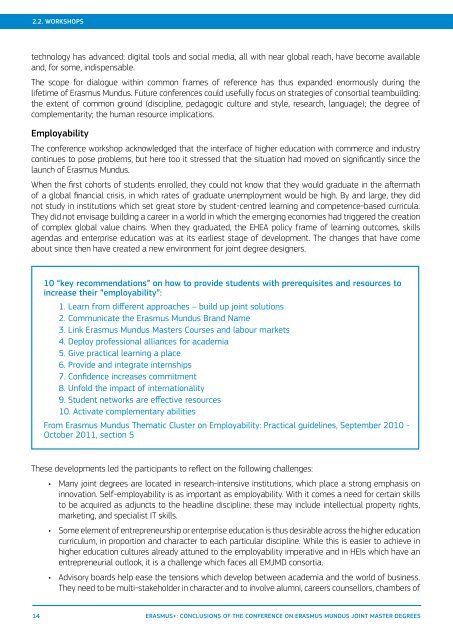Erasmus+
2kWLqbT
2kWLqbT
Create successful ePaper yourself
Turn your PDF publications into a flip-book with our unique Google optimized e-Paper software.
2.2. WORKSHOPS 2.2. WORKSHOPS TITLE<br />
technology has advanced: digital tools and social media, all with near global reach, have become available<br />
and, for some, indispensable.<br />
The scope for dialogue within common frames of reference has thus expanded enormously during the<br />
lifetime of Erasmus Mundus. Future conferences could usefully focus on strategies of consortial teambuilding:<br />
the extent of common ground (discipline, pedagogic culture and style, research, language); the degree of<br />
complementarity; the human resource implications.<br />
Employability<br />
The conference workshop acknowledged that the interface of higher education with commerce and industry<br />
continues to pose problems, but here too it stressed that the situation had moved on significantly since the<br />
launch of Erasmus Mundus.<br />
When the first cohorts of students enrolled, they could not know that they would graduate in the aftermath<br />
of a global financial crisis, in which rates of graduate unemployment would be high. By and large, they did<br />
not study in institutions which set great store by student-centred learning and competence-based curricula.<br />
They did not envisage building a career in a world in which the emerging economies had triggered the creation<br />
of complex global value chains. When they graduated, the EHEA policy frame of learning outcomes, skills<br />
agendas and enterprise education was at its earliest stage of development. The changes that have come<br />
about since then have created a new environment for joint degree designers.<br />
10 “key recommendations” on how to provide students with prerequisites and resources to<br />
increase their “employability”:<br />
1. Learn from different approaches – build up joint solutions<br />
2. Communicate the Erasmus Mundus Brand Name<br />
3. Link Erasmus Mundus Masters Courses and labour markets<br />
4. Deploy professional alliances for academia<br />
5. Give practical learning a place<br />
6. Provide and integrate internships<br />
7. Confidence increases commitment<br />
8. Unfold the impact of internationality<br />
9. Student networks are effective resources<br />
10. Activate complementary abilities<br />
From Erasmus Mundus Thematic Cluster on Employability: Practical guidelines, September 2010 -<br />
October 2011, section 5<br />
commerce with SME membership, local and national policy makers, professional bodies, trade unions,<br />
as well as employers. Advisory boards can also be a rich source of mentors.<br />
• Internships and other forms of work placement, such as volunteering, can be difficult to organise,<br />
particularly for mobile international students. Their timing, level and intensity all pose challenges, as<br />
do questions of supervision, quality and credit-allocation, but when well defined and delivered they<br />
bring substantial added value.<br />
• In an age when professionals can move relatively easily from country to country, career guidance<br />
needs to strengthen its cross-border dimension.<br />
• ‘Jointness’ can be expressed in inter-disciplinarity. This can give graduates greater potential access<br />
to, for example, emerging ‘green’ professions, particularly if the learning and teaching methodology is<br />
problem-based and in a real-world setting.<br />
• Joint degrees have always promised ‘soft skills’ alongside specialist academic competences. These can<br />
be enhanced and given direct application by the stronger participation of students in the management<br />
and quality assurance of the degree.<br />
While there is no counter-factual to reveal the trajectory of what an EMJMD graduate would have achieved<br />
had he or she not enrolled in the programme, the new generation of EMJMDs has sharpened the focus on<br />
competences and employability. Public, private and social enterprises are encouraged to participate. Proposals<br />
are expected to set out the detail of employer involvement and to demonstrate how the EMJMD will foster<br />
entrepreneurship.<br />
Nearly 70% of the EMMC graduates had found a full-time job after their studies, with almost 60%<br />
of those having found one in less than two months after graduating.<br />
Graduate Impact Survey, 2015, EMA<br />
Participants welcomed this policy platform. In order to build on it, they called for longitudinal research, based<br />
on systematic graduate tracking of selected representative cohorts and using official data, EMA surveys,<br />
social media, etc. They also reiterated the oft-repeated cry for employers to be better informed about the<br />
EMJMD action and its excellence. This insistence links with the theme of sustainability and is taken up in a<br />
later section.<br />
These developments led the participants to reflect on the following challenges:<br />
• Many joint degrees are located in research-intensive institutions, which place a strong emphasis on<br />
innovation. Self-employability is as important as employability. With it comes a need for certain skills<br />
to be acquired as adjuncts to the headline discipline: these may include intellectual property rights,<br />
marketing, and specialist IT skills.<br />
• Some element of entrepreneurship or enterprise education is thus desirable across the higher education<br />
curriculum, in proportion and character to each particular discipline. While this is easier to achieve in<br />
higher education cultures already attuned to the employability imperative and in HEIs which have an<br />
entrepreneurial outlook, it is a challenge which faces all EMJMD consortia.<br />
• Advisory boards help ease the tensions which develop between academia and the world of business.<br />
They need to be multi-stakeholder in character and to involve alumni, careers counsellors, chambers of<br />
14 ERASMUS+: CONCLUSIONS OF THE CONFERENCE ON ERASMUS MUNDUS JOINT MASTER DEGREES<br />
ERASMUS+: CONCLUSIONS OF THE CONFERENCE ON ERASMUS MUNDUS JOINT MASTER DEGREES<br />
15


